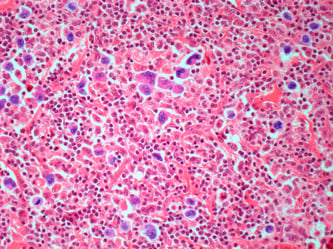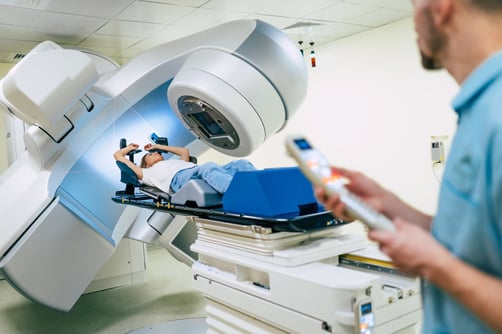Benefits and Risks of Radiation Therapy for Early Hodgkin Lymphoma
4 min read

When patients receive a diagnosis of Hodgkin lymphoma, some of their earliest questions may involve treatment regimens. Will they need chemotherapy? Will they need radiation therapy? If they wonder whether radiation therapy is necessary for early-stage Hodgkin lymphoma, they will need clear guidance.
Previously known as Hodgkin’s lymphoma, Hodgkin lymphoma affects the lymph nodes. When diagnosed and treated early, this disease responds well to therapy. The main treatments include chemotherapy and radiation, and most treatment plans include the use of both modalities. However, recent research has explored the necessity of radiation for early-stage disease, and the benefits and risks are still being weighed.
Hodgkin Lymphoma: Points of Origin and Suspicion
Like non-Hodgkin lymphoma, Hodgkin lymphoma originates from lymphoid tissue, which is found virtually anywhere in the body. The disease often begins in lymph nodes of the upper part of the body in locations such as the neck, underarms, and chest.
 Significant sites of origin include:
Significant sites of origin include:
- Adenoids and tonsils
- Lymph nodes
- Spleen
- Thymus
- Digestive tract
- Bone marrow
The most common symptom of Hodgkin lymphoma is swollen, often painless, lymph nodes. Interestingly, it is usually the proliferation of normal immune cells around the affected area – not the cancer itself – causing the swelling.
In addition to swollen lymph nodes, patients with Hodgkin lymphoma symptoms may complain of:
- Abdominal pain or swelling and a feeling of fullness
- Decreased appetite
- Fatigue
- Night sweats
- Persistent cough and shortness of breath
- Unexplained fever
- Unintentional weight loss
Despite the ambiguity of these symptoms, it is important to refer patients for an oncology consult if there is a suspicion of malignancy.
“Constitutional ‘B’ symptoms can be concerning,” said Dr. Dario Pasalic, MD, radiation oncologist at Rocky Mountain Cancer Centers (RMCC). “Constitutional symptoms such as rapid, unintentional weight loss greater than 10% of normal body weight, fever, and night sweats are important because it influences the stage, treatment options, and overall prognosis.”
Treatment Options for Early-Stage Hodgkin Lymphoma Disease
 Traditionally, the primary treatments for Hodgkin lymphoma are chemotherapy and radiation, which may be used together or individually, depending on the stage. The addition of radiation has the potential to decrease the duration and total dose of chemotherapy necessary to cure the lymphoma.
Traditionally, the primary treatments for Hodgkin lymphoma are chemotherapy and radiation, which may be used together or individually, depending on the stage. The addition of radiation has the potential to decrease the duration and total dose of chemotherapy necessary to cure the lymphoma.
Physicians have debated the use of radiation therapy early in the disease process due to the potential for radiation toxicity. While the standard treatment of early disease involves radiation therapy and two to four rounds of chemotherapy (ABVD regimen) for long-term disease control, some studies indicate radiation therapy can be avoided to bypass acute and chronic radiation-induced toxicity. Conversely, other research has found that this approach may lead to a limited, but significant, risk of recurrence. Moreover, omitting radiation therapy often requires additional cycles of chemotherapy, a tradeoff that can lead to more chronic lung and heart injury.
As early as 2014 – nearly a decade ago – an article in BioMed Research International questioned the utility of radiation therapy for both early and advanced disease stages. Noting that radiation therapy was the current standard of care, the authors commented that chemotherapy agents “with excellent safety profile” had been developed for the disease”
The authors surveyed several trials in which radiation therapy was omitted, finding chemotherapy-only treatment to be effective for patients with early-stage disease. In fact, in some instances, mortality was higher in the group receiving radiation treatment than in the chemotherapy-only group. However, larger trials showed “better disease control and less progression” in approaches combining chemotherapy and radiation. The authors concluded that modern (as of 2014) radiation techniques can ameliorate some of the side effects of radiation therapy while preserving its benefits.
In 2019, two presentation at the American Society for Radiation Oncology Annual Meeting revisited the topic. The presenters reaffirmed the earlier conclusions in the field: that omitting radiation therapy, even in early-stage Hodgkin lymphoma with the best response to upfront chemotherapy based on PET scan imaging, leads to higher rates of recurrence. In one trial of 1,150 patients with newly diagnosed favorable early-stage disease, the group receiving radiation and chemotherapy had a statistically superior benefit to five-year, progression-free survival (93.4%) compared with chemotherapy alone (86.1%).
The Radiation Conundrum: The Patient Experience
In general, any form of combination treatment intensifies side effects and is harder on patients, so the potential for eliminating a treatment that may be unnecessary offers benefits to patients hoping to avoid side effects.
The degree of impact of radiation therapy in particular depends on the dose of radiation and the treatment location.
Most acute symptoms include skin irritation, sore throat, fatigue, and cough.
More chronic effects of radiation therapy include secondary malignancies in the part of the body exposed to radiation. The most common secondary malignancies are the development of breast cancer in women and lung cancer in men.
“While radiation therapy can increase the chances of curing Hodgkin lymphoma, we have appreciated the potential for chronic side effects,” said Dr. Dario Pasalic, MD. “Determining the right balance of chemotherapy and radiation therapy is crucial, and can only be accomplished by discussing every case in a multidisciplinary setting.”
Still, as the research indicates, treatment with radiation is often necessary.
“When we have to use radiation therapy, rest assured that the risk of side effects has decreased over the years due to more advanced technology and reduced field sizes,” Dr. Pasalic said. “We want to minimize radiation exposure as much as possible while explicitly targeting the cancer to improve patient outcomes and quality of life.”
Whether with radiation therapy or another treatment, RMCC tailors care to patients according to their diagnosis and stage of cancer. Our team includes specialists in medical, radiation, and surgical oncology, as well as hematology, pathology, and palliative care. Refer a patient today and we’ll contact you to discuss your patient’s case.